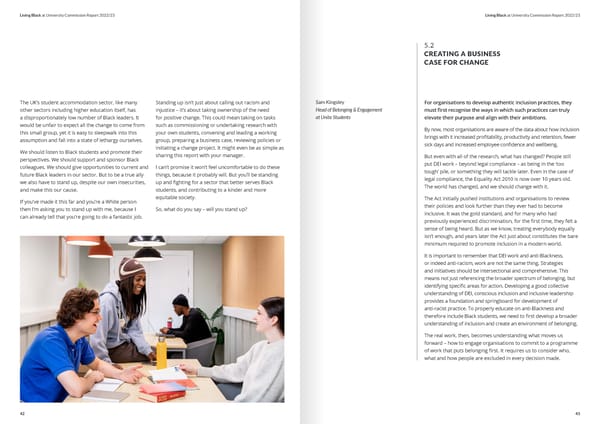Living Black at University Commission Report 2022/23 Living Black at University Commission Report 2022/23 5.2 CREATING A BUSINESS CASE FOR CHANGE The UK’s student accommodation sector, like many Standing up isn’t just about calling out racism and Sam Kingsley For organisations to develop authentic inclusion practices, they other sectors including higher education itself, has injustice – it’s about taking ownership of the need Head of Belonging & Engagement must 昀椀rst recognise the ways in which such practices can truly a disproportionately low number of Black leaders. It for positive change. This could mean taking on tasks at Unite Students elevate their purpose and align with their ambitions. would be unfair to expect all the change to come from such as commissioning or undertaking research with By now, most organisations are aware of the data about how inclusion this small group, yet it is easy to sleepwalk into this your own students, convening and leading a working assumption and fall into a state of lethargy ourselves. group, preparing a business case, reviewing policies or brings with it increased pro昀椀tability, productivity and retention, fewer initiating a change project. It might even be as simple as sick days and increased employee con昀椀dence and wellbeing. We should listen to Black students and promote their sharing this report with your manager. But even with all of the research, what has changed? People still perspectives. We should support and sponsor Black put DEI work – beyond legal compliance – as being in the ‘too colleagues. We should give opportunities to current and I can’t promise it won’t feel uncomfortable to do these tough’ pile, or something they will tackle later. Even in the case of future Black leaders in our sector. But to be a true ally things, because it probably will. But you’ll be standing legal compliance, the Equality Act 2010 is now over 10 years old. we also have to stand up, despite our own insecurities, up and 昀椀ghting for a sector that better serves Black The world has changed, and we should change with it. and make this our cause. students, and contributing to a kinder and more If you’ve made it this far and you’re a White person equitable society. The Act initially pushed institutions and organisations to review then I’m asking you to stand up with me, because I So, what do you say – will you stand up? their policies and look further than they ever had to become can already tell that you’re going to do a fantastic job. inclusive. It was the gold standard, and for many who had previously experienced discrimination, for the 昀椀rst time, they felt a sense of being heard. But as we know, treating everybody equally isn’t enough, and years later the Act just about constitutes the bare minimum required to promote inclusion in a modern world. It is important to remember that DEI work and anti-Blackness, or indeed anti-racism, work are not the same thing. Strategies and initiatives should be intersectional and comprehensive. This means not just referencing the broader spectrum of belonging, but identifying speci昀椀c areas for action. Developing a good collective understanding of DEI, conscious inclusion and inclusive leadership provides a foundation and springboard for development of anti-racist practice. To properly educate on anti-Blackness and therefore include Black students, we need to 昀椀rst develop a broader understanding of inclusion and create an environment of belonging. The real work, then, becomes understanding what moves us forward – how to engage organisations to commit to a programme of work that puts belonging 昀椀rst. It requires us to consider who, what and how people are excluded in every decision made. 42 43
 Living Black at University Commission Report web Page 21 Page 23
Living Black at University Commission Report web Page 21 Page 23